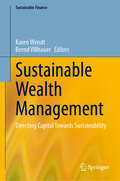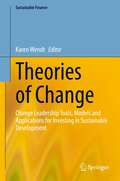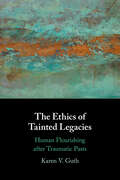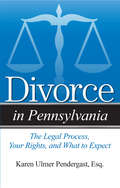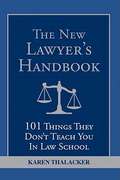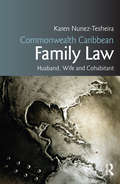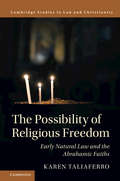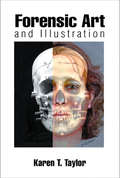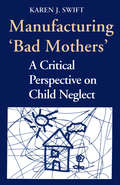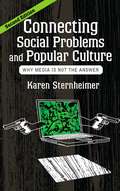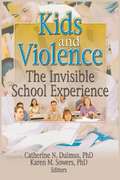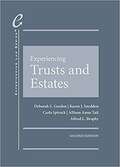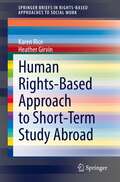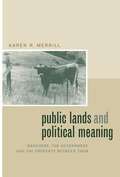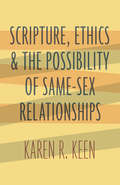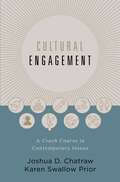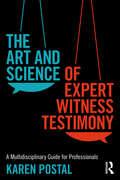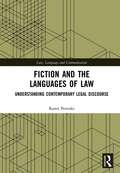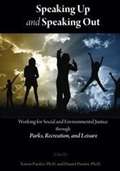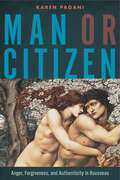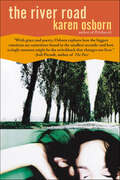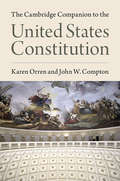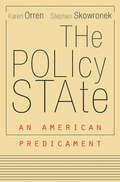- Table View
- List View
Sustainable Wealth Management: Directing Capital Towards Sustainability (Sustainable Finance)
by Karen Wendt Bernd VillhauerThis book explores sustainable wealth management and the challenges that arise for asset managers in times of ecological crises and climate change. It deals with portfolio engineering, combining risk and impact, transitioning from environmental, social, and governance (ESG) concepts to Sustainable Development Goals (SDG) concepts and the different role of the intermediaries and players in the financial markets. It provides researchers, scholars, academics and policy makers an interdisciplinary approach to redirecting capital towards sustainability.
Theories of Change: Change Leadership Tools, Models and Applications for Investing in Sustainable Development (Sustainable Finance)
by Karen WendtToday, it has become strikingly obvious that companies no longer operate in an environment where only risk return and volatility describe the business environment. The business has to deal with volatility plus uncertainty, plus complexity and ambiguity (VUCA): that requires new qualities, competencies, frameworks; and it demands a new mind set to deal with the VUCA environment in investment, funding and financing. This book builds on a new megatrend beyond resilience, called anti-fragility. We have had the black swan (financial crisis) and the red swan (COVID) - the Bank for International Settlement is preparing for regenerative capitalism, block chain based analysis of financial streams and is aiming to prevent the “Green Swan” – the climate crisis to lead to the next lockdown. In the light of the UN 17 Sustainable Development Goals, what is required, is Theories of Change.Written by experts working in the fields of sustainable finance, impact investing, development finance, carbon divesting, innovation, scaling finance, impact entrepreneurship, social stock exchanges, alternative currencies, Initial Coin Offerings (ICOs), ledger technologies, civil action, co-creation, impact management, deep learning and transformation leadership, the book begins by analysing existing Theories of Change frameworks from various disciplines and creating a new integrated model – the meta-framework. In turn, it presents insights on creating and using Theories of Change to redirect investment capital to sustainable companies while implementing the Sustainable Development Goals and the Paris Climate Agreement. Further, it discusses the perspective of planetary boundaries as defined by the Stockholm Resilience Institute, and investigates various aspects of systems, organizations, entrepreneurship, investment and finance that are closely tied to the mission ingrained in the Theory of Change. As it demonstrates, solutions that ensure the parity of profit, people and planet through dynamic change can effectively address the needs of entrepreneurs and business. By exploring these concepts and their application, the book helps create and shape new markets and opportunities.
The Ethics of Tainted Legacies: Human Flourishing after Traumatic Pasts
by Karen V. GuthWhat do we do when a beloved comedian known as “America's Dad” is convicted of sexual assault? Or when the man who wrote “all men are created equal” owned slaves? Or when priests are exposed as pedophiles? From the popular to the political to the profound, each day brings new revelations that respected people, traditions, and institutions are not what we thought they were. Despite the shock that these revelations produce, this state of affairs is anything but new. The problem of what to do when those we revere are shown to be compromised is a fundamental existential condition. In this book, Karen V. Guth identifies “tainted legacies” as a pressing contemporary moral problem and ethical challenge. Constructing a typology of responses to compromised thinkers, traditions, and institutions, she demonstrates the relevance of age-old debates in Christian theology for those who confront legacies tarnished by the traumas of slavery, racism, and sexual violence.
Divorce in Pennsylvania: The Legal Process, Your Rights, and What to Expect (Divorce In)
by Karen Ulmer PendergastProviding accurate and objective information to help make the right decisions during a divorce in Pennsylvania, this guide provides answers to 360 queries such as: How quickly can one get a divorce? Who decides who gets the cars, the pets, and the house? What actions might influence child custody? How are bills divided and paid during the divorce? How much will a divorce cost? and Will a spouse have to pay some or all attorney fees? Structured in a question-and-answer format, this handbook provides clear responses to help build confidence and give the peace of mind needed to meet the challenges of a divorce proceeding.
The New Lawyer's Handbook
by Karen Thalacker101 Success Strategies They Didn't Teach You in Law School - get expert advice on becoming a better lawyer. Law school prepares you to think like a lawyer, write like a lawyer, and research like a lawyer-but once you're in the door of a law firm, there's a whole new set of skills you need. The New Lawyer's Handbook guides you through the 101 essential things you need to know in order to excel. From how to handle your clients and how to work with people in your office, to why it pays to learn to play golf and maintain some semblance of a family life even as you make your billables, The New Lawyer's Handbook gives you the knowledge you need to succeed.
Commonwealth Caribbean Family Law: Husband, Wife, and Cohabitant (Commonwealth Caribbean Law)
by Karen TesheiraThis important new text is the product of several years of research of the family law of fifteen Commonwealth Caribbean jurisdictions. It is the first and only legal text that comprehensively covers all the main substantive areas of spousal family law, including marriage, divorce, financial support, property rights and domestic violence. The rights of the statutory spouse in the jurisdictions of Barbados, Belize, Guyana, Jamaica, and Trinidad and Tobago are examined, thus addressing, on a jurisdictional basis, an important area of spousal family that is seldom covered in English family law texts. The book also covers the number and variations of divorce regimes applicable to the region – the matrimonial offence divorce model of Guyana and Montserrat, the English five fact model of Trinidad and Tobago, Dominica, Grenada, Anguilla, and St Vincent and the Grenadines, the hybrid model of Antigua and Barbuda, Belize and St Kitts and Nevis, and the no fault model of Jamaica and Barbados. This book will prove an indispensable resource for law students and legal academics, as well as for family law practitioners across the English-speaking Caribbean. Other professionals, including sociologists and social workers, will also find the book useful and informative.
The Possibility of Religious Freedom: Early Natural Law and the Abrahamic Faiths (Law and Christianity)
by Karen TaliaferroReligious freedom is one of the most debated and controversial human rights in contemporary public discourse. At once a universally held human right and a flash point in the political sphere, religious freedom has resisted scholarly efforts to define its parameters. Taliaferro explores a different way of examining the tensions between the aims of religion and the needs of political communities, arguing that religious freedom is a uniquely difficult human right to uphold because it rests on two competing conceptions, human and divine. Drawing on classical natural law, Taliaferro expounds a new, practical theory of religious freedom for the modern world. By examining conceptions of law such as Sophocles' Antigone, Maimonides' Guide of the Perplexed, Ibn Rushd's Middle Commentary on Aristotle's Rhetoric, and Tertullian's writings, The Possibility of Religious Freedom explains how expanding our notion of law to incorporate such theories can mediate conflicts of human and divine law and provide a solid foundation for religious liberty in modernity's pluralism.
Forensic Art and Illustration
by Karen T. TaylorAs the number of stranger-on-stranger crimes increases, solving these crimes becomes more challenging. Forensic illustration has become increasingly important as a tool in identifying both perpetrators and victims. Now a leading forensic artist, who has taught this subject at law enforcement academies, schools, and universities internationally, off
Manufacturing 'Bad Mothers': A Critical Perspective on Child Neglect
by Karen SwiftChild neglect has been characterized over the past century as a problem of deficient care of children by mothers. A complex and punitive child welfare system has emerged, based on a view that the children of these mothers require legally sanctioned rescue by those better suited to care for them. Karen Swift challenges both the accepted view of child neglect and the present official response to it. Beginning from a critical theoretical perspective, she argues that our usual perceptions of neglect hide and distort important social realities. This distorted perception only serves to reproduce the conditions of poverty, marginalization, and violence in which these families live. The current child welfare system, far from rescuing neglected children, helps instead to ensure the continuation of their problems, and the outcome is especially dramatic and damaging in Aboriginal communities. Swift explores the historical, organizational, and professional dimensions within which child neglect becomes a visible social reality. Also examined are relations of class, race, and gender embedded in our usual understanding of child neglect. The discussion shows how these relations are continually reproduced through ordinary, everyday work practices of social workers and others who deal with mothers accused of child neglect. The 'good parent' model, through which help and authority are apparently merged, continually indicates that the mothers are unworthy of help. Their own experience disappears as they are faced with procedures designed to examine their present suitability for the job of parenting. The same procedures produce children as actually being helped through the exertion of state authority over their parents – but most of the help provided children is theoretical, and some of it is quite damaging. Swift also looks at both current and alternative notions of helping families. Finally, she argues that each of us can help to transform oppressive social realities.
On Manners (Thinking in Action)
by Karen StohrMany otherwise enlightened people often dismiss etiquette as a trivial subject or--worse yet--as nothing but a disguise for moral hypocrisy or unjust social hierarchies. Such sentiments either mistakenly assume that most manners merely frame the "real issues" of any interpersonal exchange or are the ugly vestiges of outdated, unfair social arrangements. But in On Manners, Karen Stohr turns the tables on these easy prejudices, demonstrating that the scope of manners is much broader than most people realize and that manners lead directly to the roots of enduring ethical questions. Stohr suggests that though manners are mostly conventional, they are nevertheless authoritative insofar as they are a primary means by which we express moral attitudes and commitments and carry out important moral goals. Drawing primarily on Aristotle and Kant and with references to a wide range of cultural examples--from Jane Austen's Pride and Prejudice to Larry David's Curb Your Enthusiasm--the author ultimately concludes that good manners are essential to moral character.
Connecting Social Problems and Popular Culture
by Karen SternheimerIs violence on the streets caused by violence in video games? Does cyber-bullying lead to an increase in suicide rates? Are teens promiscuous because of Teen Mom? As Karen Sternheimer clearly demonstrates, popular culture is an easy scapegoat for many of society’s problems, but it is almost always the wrong answer. Now in its second edition, Connecting Social Problems and Popular Culture goes beyond the news-grabbing headlines claiming that popular culture is public enemy number one to consider what really causes the social problems we are most concerned about. The sobering fact is that a "media made them do it" explanation fails to illuminate the roots of social problems like poverty, violence, and environmental degradation. Sternheimer’s analysis deftly illustrates how welfare "reform," a two-tiered health care system, and other difficult systemic issues have far more to do with our contemporary social problems than Grand Theft Auto or Facebook. The fully-revised new edition features recent moral panics--think sexting and cyberbullying--and an entirely new chapter exploring social media. Expanded discussion of how we understand society’s problems as social constructions without disregarding empirical evidence, as well as the cultural and structural issues underlying those ills, allows students to stretch their sociological imaginations.
Kids and Violence: The Invisible School Experience
by Catherine Dulmus Karen SowersImplement prevention interventions and policies to curb the cycle of violence in our schools!Kids and Violence: The Invisible School Experience examines overt and covert violence occurring in the school setting involving students, school personnel, and school policy, and highlights a level of violence that is often hidden, ignored, or subtly tolerated. This book provides the latest research findings on various issues of violence in our schools. It also shows what happens when the adults responsible for the well-being of our children are actually perpetrating violence, staying silent about violence, or upholding a system that supports a violent atmosphere.Kids and Violence is unique in its holistic and systemic approach of examining types of violence that are often overlooked or endorsed by school policies. The book includes 11 chapters focusing on issues such as bullying, school personnel&’s role in violence, and prevention programs. The contributors are experts in their fields and include professors, deans, and directors of university social work schools. Kids and Violence presents the results of an exploratory study that examines self-identified bullies and addresses issues of immediate and vital importance, including: bullying among students, grades 3-8, in a rural school district observations by school personnel on bullying among elementary and middle school students corporal punishment as a cultural norm in the United States and its impact on discipline in our schools solution-focused crisis intervention with adolescents bullying of children and other abuses of power by school personnel adolescent dating violence in the school setting and much more!It is time to stop the harmful cycle of violence in our schools. This valuable resource serves as a call for immediate action, showing social workers and policymakers how to provide leadership in researching, developing, and delivering empirically-based prevention interventions and policies.
Experiencing Trusts and Estates (Experiencing Law Series)
by Deborah Gordon Allison Tait Alfred Brophy Carla Spivack Karen SneddonThis textbook takes a learner-centered and experiential approach to trusts and estates law, which makes it well suited to teaching both online and face-to-face. The opening chapters introduce students to key concepts in intergenerational wealth transfer and planning for incapacity and death. The remainder of the book highlights inheritance law concepts from both a forward-looking (planning/drafting) and backward-looking (litigation) perspective. <p><P> The second edition continues to feature some of the most teachable trusts and estates cases, to focus on issues of gender, race, class, and sexuality, and to offer online student resources. New features of this edition include learning outcomes at the beginning of each chapter to help with ABA compliance and student focus, a broad and varied array of formative assessments, a glossary of terms, highlight boxes containing practice notes, connection notes, and language notes, and final chapter take-aways to link topics together. Some examples of assessments include; role playing exercises; drafting client letters and testamentary instruments; writing policy papers, legislation, and judicial opinions; and preparing community and client presentations. Each chapter also features more traditional hypotheticals, fact patterns, and discussion questions, extensive notes designed to help lead students through the major issues, and an appendix of sample documents.
Human Rights-Based Approach to Short-Term Study Abroad (SpringerBriefs in Rights-Based Approaches to Social Work)
by Karen Rice Heather GirvinShort-term study abroad experiences are on the rise across social work programs. This increase is fueled by the Educational Policy and Accreditation Standards of the Council on Social Work Education (CSWE) that social work programs graduate students who are ready to engage diversity and function ethically as global citizens who understand mechanisms of oppression. With the increasing number of short-term study abroad trips, this brief offers a framework that provides strategies for empowering the populations and communities in which these trips occur. Developing short-term study abroad trips from a human rights-based framework rather than a needs-based approach is urgent and necessary, as the community in which the visit will occur is placed at the center of planning efforts and its members become equal and active participants. The brief is accessible and relevant to both instructors and students, with thoughtful emphasis placed in each chapter to align with the needs of each group more distinctly. It is conceived with both travel-based (field education) and classroom learning (pre-trip preparation) in mind. Though developed with more depth, theory, and evidence than a "how-to manual," the brief serves as an exemplary "guide" that prepares those engaging in short-term study abroad trips with information and strategies that are derived from the key concepts of a rights-based approach to field education. Human Rights-Based Approach to Short-Term Study Abroad is essential reading that engages students and faculty with case examples to illuminate the complex concepts that are taught by faculty as well as specific exercises and assignments to guide both faculty and student through the process of developing and implementing short-term study abroad trips. This brief is of immediate relevance for undergraduate and graduate coursework in field education, international social work, human rights, global social work, and macro social work, as well as useful for any practitioner seeking CSWE accreditation.
Public Lands and Political Meaning: Ranchers, the Government, and the Property Between Them
by Karen R. MerrillThe history behind the recurring "sagebrush rebellions" in the American West, showing how (before environmentalists entered the fray) ranchers and the feds struggled over the uses of public lands, from the days when ranchers wanted more government support to the virulent anti-federal position that remains.
Scripture, Ethics, and the Possibility of Same-Sex Relationships
by Karen R. KeenWHEN IT COMES TO SAME-SEX RELATIONSHIPS, this book by Karen Keen contains the most thoughtful, balanced, biblically grounded discussion you’re likely to encounter anywhere. With pastoral sensitivity and respect for biblical authority, Keen breaks through current stalemates in the debate surrounding faith and sexual identity.The fresh, evenhanded reevaluation of Scripture, Christian tradition, theology, and science in Keen’s Scripture, Ethics, and the Possibility of Same-Sex Relationships will appeal to both traditionalist and progressive church leaders and parishioners, students of ethics and biblical studies, and gay and lesbian people who often feel painfully torn between faith and sexuality.
Scripture, Ethics, and the Possibility of Same-Sex Relationships
by Karen R. KeenWHEN IT COMES TO SAME-SEX RELATIONSHIPS, this book by Karen Keen contains the most thoughtful, balanced, biblically grounded discussion you&’re likely to encounter anywhere. With pastoral sensitivity and respect for biblical authority, Keen breaks through current stalemates in the debate surrounding faith and sexual identity.The fresh, evenhanded reevaluation of Scripture, Christian tradition, theology, and science in Keen&’s Scripture, Ethics, and the Possibility of Same-Sex Relationships will appeal to both traditionalist and progressive church leaders and parishioners, students of ethics and biblical studies, and gay and lesbian people who often feel painfully torn between faith and sexuality.
Cultural Engagement: A Crash Course in Contemporary Issues
by Joshua Chatraw Karen PriorHow should Christians approach important contemporary issues like war, race, creation care, gender, and politics?Christians in every culture are confronted with social trends and moral questions that can be difficult to navigate. But, the Bible often doesn't speak directly to such issues. Even when it does, it can be confusing to know how best to apply the biblical teaching. <p><p> In Cultural Engagement: A Crash Course in Contemporary Issues authors Joshua D. Chatraw and Karen Swallow Prior first offer a broadly accessible framework for cultural engagement and then explore specific hot topics in current Western culture. <p> Featuring contributions from over forty top thinkers, proponents of various views on the specific topics present their approaches in their own words, providing readers an opportunity to fairly consider options. <p> Unique in how it addresses both big-picture questions about cultural engagement and pressing current issues, Cultural Engagement provides a thorough and broad introduction useful for students, professors, pastors, college ministers, and any believer wanting to more effectively exercise their faith in the public square.
The Art and Science of Expert Witness Testimony: A Multidisciplinary Guide for Professionals
by Karen PostalFeaturing in-depth interviews of attorneys, judges, and seasoned forensic experts from multiple disciplines including psychology, medicine, economics, history, and neuropsychology, The Art and Science of Expert Witness Testimony highlights and offers bridges for the areas where the needs and expectations of the courtroom collide with experts’ communication habits developed over years of academic and professional training. Rather than seeing testimony as a one-way download from expert to jurors, The Art and Science of Expert Witness Testimony focuses on the direct, dynamic, unique communication relationship that develops as each juror’s lived experience interacts with the words of experts on the stand. This book expands the academic tradition of "methods-centered credibility" to also include "person-centered credibility," where warmth, confidence, and relentless attention to detail build trust with jurors. Seasoned forensic experts share what they actually say on the stand: their best strategies and techniques for disrupting traditional academic communication and creating access to science and professional opinions with vivid, clear language and strong visuals. The difficult but necessary emotional work of the courtroom is addressed with specific techniques to regulate emotions in order to maintain person-centered credibility and keep the needs of jurors front and center through cross-examination. This innovative compilation of research is essential reading for professionals and practitioners, such as physicians, engineers, accountants, and scientists, that may find themselves experts in a courtroom. The Art and Science of Expert Witness Testimony provides a unique experience for readers, akin to being personally mentored by over eighty-five attorneys, judges, and seasoned experts as they share their observations, insights, and strategies—not to "win" as a defense, prosecution, or plaintiff expert, but to be productive in helping jurors and other triers of fact do their difficult intellectual job in deciding a case.
Fiction and the Languages of Law: Understanding Contemporary Legal Discourse (Law, Language and Communication)
by Karen PetroskiContemporary legal reasoning has more in common with fictional discourse than we tend to realize. Through an examination of the U.S. Supreme Court’s written output during a recent landmark term, this book exposes many of the parallels between these two special kinds of language use. Focusing on linguistic and rhetorical patterns in the dozens of reasoned opinions issued by the Court between October 2014 and June 2015, the book takes nonlawyer readers on a lively tour of contemporary American legal reasoning and acquaints legal readers with some surprising features of their own thinking and writing habits. It analyzes cases addressing a huge variety of issues, ranging from the rights of drivers stopped by the police to the decision-making processes of the Environmental Protection Agency—as well as the term’s best-known case, which recognized a constitutional right to marriage for same-sex as well as different-sex couples. Fiction and the Languages of Law reframes a number of long-running legal debates, identifies other related paradoxes within legal discourse, and traces them all to common sources: judges’ and lawyers’ habit of alternating unselfconsciously between two different attitudes toward the language they use, and a set of professional biases that tends to prevent scrutiny of that habit.
Speaking Up and Speaking Out: Working for Social and Environmental Justice through Parks, Recreation, and Leisure
by Karen Paisley Daniel DustinWho speaks up for the disadvantaged? Who speaks out for the disenfranchised? Who safeguards the rights of the dispossessed? Speaking Up and Speaking Out explores the role of parks, recreation, and leisure in promoting social and environmental justice.
Man or Citizen: Anger, Forgiveness, and Authenticity in Rousseau (G - Reference, Information and Interdisciplinary Subjects)
by Karen PaganiThe French studies scholar Patrick Coleman made the important observation that over the course of the eighteenth century, the social meanings of anger became increasingly democratized. The work of Jean-Jacques Rousseau is an outstanding example of this change. In Man or Citizen, Karen Pagani expands, in original and fascinating ways, the study of anger in Rousseau’s autobiographical, literary, and philosophical works. Pagani is especially interested in how and to what degree anger—and various reconciliatory responses to anger, such as forgiveness—functions as a defining aspect of one’s identity, both as a private individual and as a public citizen. Rousseau himself was, as Pagani puts it, “unabashed” in his own anger and indignation—toward society on one hand (corrupter of our naturally good and authentic selves) and, on the other, toward certain individuals who had somehow wronged him (his famous philosophical disputes with Voltaire and Diderot, for example). In Rousseau’s work, Pagani finds that the extent to which an individual processes, expresses, and eventually resolves or satisfies anger is very much of moral and political concern. She argues that for Rousseau, anger is not only inevitable but also indispensable, and that the incapacity to experience it renders one amoral, while the ability to experience it is a key element of good citizenship.
The River Road: A Novel
by Karen OsbornDavid and Michael Sanderson are brothers, inseparable since childhood from each other and from their neighbor Kay Richards, a complicated young woman involved in a passionate and obsessive love affair with David. One spring night, while at home on a break from college, the threesome embarks on a night of adventure and experimentation, driving recklessly through the Connecticut Valley. Stopping at the French King Bridge, David -- full of hubris and hallucinogens -- dares to jump, mistakenly believing he'll be able to swim ashore. With this one act, he sets in motion an inexorable chain of events that indelibly alters the lives of everyone involved.Told through the alternating voices of Kay, Michael, and David's father, Kevin, The River Road is a closely observed and psychologically penetrating narrative of the accusations, murder investigation, and courtroom battle that follow.
The Cambridge Companion to the United States Constitution
by John W. Compton Karen OrrenThis Companion provides a broad, historically informed introduction to the study of the US constitutional system. In place of the usual laundry lists of cases, doctrines, and theories, it presents a picture of the constitutional system in action, with separate sections devoted to constitutional principles, organizational structures, and the various legal and extra-legal 'actions' through which litigators and average citizens have attempted to bring about constitutional change. Finally, the volume covers a number of subjects that are rarely discussed in works aimed at a general audience, but which are critical to ensuring that constitutional rights are honored in the day-to-day lives of citizens. These include standing and causes of action, suits against officeholders, and the inner workings of the Foreign Intelligence Surveillance Court (FISC). This Companion places present-day constitutional controversies in historical context, and offers insights from a range of disciplines, including history, political science, and law.
The Policy State: An American Predicament
by Karen OrrenPolicy is government’s response to changing times, the key to its successful adaptation. It tackles problems as they arise, from foreign relations and economic affairs to race relations and family affairs. Karen Orren and Stephen Skowronek take a close look at this well-known reality of modern governance: the expanded domain of the “policy state.”
